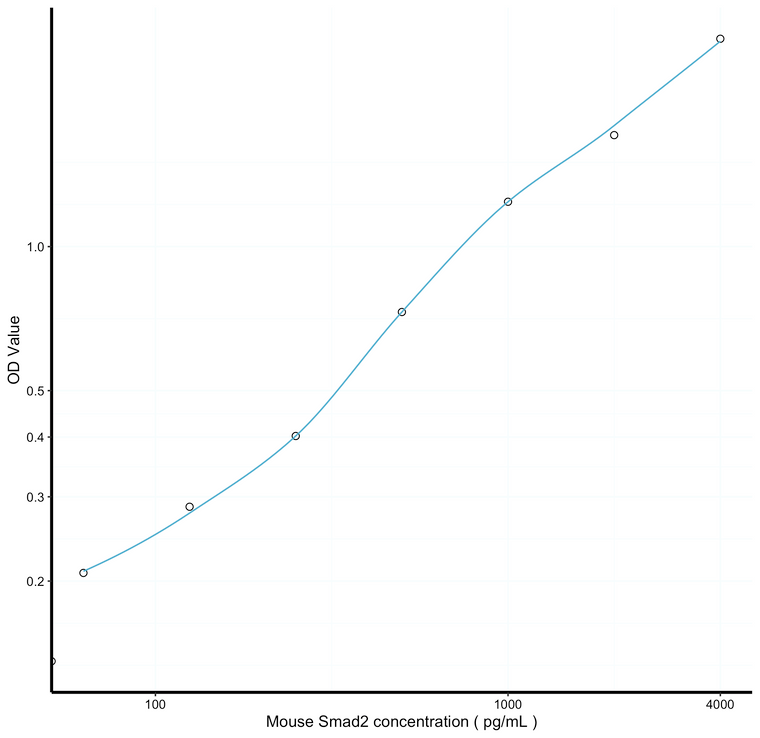| Applications: |
ELISA |
| Reactivity: |
Mouse |
| Note: |
STRICTLY FOR FURTHER SCIENTIFIC RESEARCH USE ONLY (RUO). MUST NOT TO BE USED IN DIAGNOSTIC OR THERAPEUTIC APPLICATIONS. |
| Sensitivity: |
24.6pg/mL |
| Detection Limit: |
62.5-4000pg/mL |
| Short Description: |
This Smad2 Sandwich ELISA Kit, Ready-To-Use is an in-vitro enzyme-linked immunosorbent assay for the measurement of samples in mouse cell culture supernatant, serum and plasma (EDTA, citrate, heparin). |
| Storage Instruction: |
The whole kit may be stored at-20°C for up to 12 months from receipt. An unopened kit may be stored in the fridge at 2-8°C for up to 6 months. Once opened store individual kit contents according to components table provided with the kit. |
| Assay Time: |
3 hrs |
| Gene Symbol: |
Smad2 |
| Gene ID: |
17126 |
| Uniprot ID: |
SMAD2_MOUSE |
| Immunogen Region: |
Ready-To-Use |
| Sample Type: |
tissue homogenates, cell lysates, cell culture supernates or other biological fluids. |
| Tissue Specificity | |
| Post Translational Modifications | In response to TGF-beta, phosphorylated on the C-terminal SXS motif by TGF-beta and activin type 1 receptor kinases, phosphorylation declines progressively in a KMT5A-dependent manner. Phosphorylation in this motif is required for interaction with a number of proteins including SMURF2, SNON and SMAD4 in response to TGF-beta. Dephosphorylated in this motif by PPM1A leading to disruption of the SMAD2/3-SMAD4 complex, nuclear export and termination of the TGF-beta signaling. In response to decorin, the naturally occurring inhibitor of TGF-beta signaling, phosphorylated on Ser-240 by CaMK2. Phosphorylated by MAPK3 upon EGF stimulation.which increases transcriptional activity and stability, and is blocked by calmodulin. Phosphorylated by PDPK1. In response to TGF-beta, ubiquitinated by NEDD4L.which promotes its degradation. Monoubiquitinated, leading to prevent DNA-binding. Deubiquitination by USP15 alleviates inhibition and promotes activation of TGF-beta target genes. Ubiquitinated by RNF111, leading to its degradation: only SMAD2 proteins that are 'in use' are targeted by RNF111, RNF111 playing a key role in activating SMAD2 and regulating its turnover. Acetylated on Lys-19 by coactivators in response to TGF-beta signaling, which increases transcriptional activity. |
| Function | Receptor-regulated SMAD (R-SMAD) that is an intracellular signal transducer and transcriptional modulator activated by TGF-beta (transforming growth factor) and activin type 1 receptor kinases. Binds the TRE element in the promoter region of many genes that are regulated by TGF-beta and, on formation of the SMAD2/SMAD4 complex, activates transcription. Promotes TGFB1-mediated transcription of odontoblastic differentiation genes in dental papilla cells. Positively regulates PDPK1 kinase activity by stimulating its dissociation from the 14-3-3 protein YWHAQ which acts as a negative regulator. |
| Protein Name | Mothers Against Decapentaplegic Homolog 2Mad Homolog 2Mothers Against Dpp Homolog 2Mad-Related Protein 2Mmad2Smad Family Member 2Smad 2Smad2 |
| Database Links | Reactome: R-MMU-1181150Reactome: -MMU-1502540Reactome: -MMU-2173788Reactome: -MMU-2173789Reactome: -MMU-2173795Reactome: -MMU-2173796Reactome: -MMU-5689880Reactome: -MMU-9617828 |
| Cellular Localisation | CytoplasmNucleusCytoplasmic And Nuclear In The Absence Of Tgf-BetaOn Tgf-Beta StimulationMigrates To The Nucleus When Complexed With Smad4 Or With Ipo7On Dephosphorylation By Phosphatase Ppm1aReleased From The Smad2/Smad4 ComplexAnd Exported Out Of The Nucleus By Interaction With Ranbp1Localized Mainly To The Nucleus In The Early Stages Of Embryo Development With Expression Becoming Evident In The Cytoplasm At The Blastocyst And Epiblast Stages |
| Alternative ELISA Names | Mothers Against Decapentaplegic Homolog 2 ELISA kitMad Homolog 2 ELISA kitMothers Against Dpp Homolog 2 ELISA kitMad-Related Protein 2 ELISA kitMmad2 ELISA kitSmad Family Member 2 ELISA kitSmad 2 ELISA kitSmad2 ELISA kitSmad2 ELISA kitMadh2 ELISA kitMadr2 ELISA kit |
| output | |
Information sourced from Uniprot.org
12 months for antibodies. 6 months for ELISA Kits. Please see website T&Cs for further guidance







